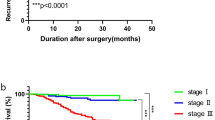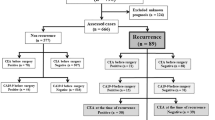Abstract
Objective
The aim of this study was to determine the prognostic significance of preoperative carcinoembryonic antigen (CEA) and carbohydrate antigen (CA) 19-9 levels in patients with resectable gastric cancer (GC).
Patients and Methods
Patients who underwent a radical resection for GC at the Fujian Medical University Union Hospital between 2007 and 2014 were included in this study. The estimated area under the curve (AUC) was compared to evaluate the discriminatory ability of tumor makers. Additional external validation was performed using a dataset from Sun Yat-sen University Cancer Center.
Results
Preoperative CEA/CA19-9 levels were identified as an independent predictor of overall survival (OS) and disease-specific survival (DSS) (both p < 0.05) in the development group. In a subgroup analysis based on TNM stage, preoperative CEA/CA19-9 levels clearly stratified the survival rates for stage III GC (p < 0.05). A multivariate analysis revealed that preoperative CEA/CA19-9 levels were an independent prognostic factor (p < 0.05) in stage III; the AUC of the preoperative CEA/CA19-9 was equivalent to that of T stage. A prediction model (TNMC) for stage III GC was developed by incorporating preoperative CEA/CA19-9 levels into the American Joint Committee on Cancer (AJCC) staging system. The AUC of the TNMC was significantly higher than that of the TNM staging system at 1, 3, and 5 years postoperatively (all p < 0.05), with similar results also being obtained in the external validation set.
Conclusion
Preoperative CEA/CA19-9 levels are an independent predictor of OS and DSS in stage III GC patients. The inclusion of preoperative CEA/CA19-9 levels in AJCC TNM staging provided an optimal prognosis in stage III GC.


Similar content being viewed by others
References
Ferlay J, Soerjomataram I, Dikshit R et al. Cancer incidence and mortality worldwide: sources, methods and major patterns in GLOBOCAN 2012. Int J Cancer. 2015; 5: E359–86.
Siewert JR, Bottcher K, Stein HJ, Roder JD. Relevant prognostic factors in gastric cancer: ten-year results of the german gastric cancer study. Ann Surg. 1998; 4: 449–61.
Kim JP, Kim YW, Yang HK, Noh DY. Significant prognostic factors by multivariate analysis of 3926 gastric cancer patients. World J Surg. 1994; 6: 872–7, 877–8.
Edge SB Byrd DR. AJCC Cancer staging manual. 7th Ed, New York: Springer; 2010.
Cancer Genome Atlas Research Network. Comprehensive molecular characterization of gastric adenocarcinoma. Nature. 2014; 7517: 202–9.
Park JC, Lee YC, Kim JH et al. Clinicopathological aspects and prognostic value with respect to age: an analysis of 3362 consecutive gastric cancer patients. J Surg Oncol. 2009; 7: 395–401.
Deng K, Yang L, Hu B, Wu H, Zhu H, Tang C. The prognostic significance of pretreatment serum cea levels in gastric cancer: a meta-analysis including 14,651 patients. PLoS ONE. 2015; 4: e124151.
Compton C, Fenoglio-Preiser CM, Pettigrew N, Fielding LP. American Joint Committee on Cancer Prognostic Factors Consensus Conference: colorectal working group. Cancer. 2000; 7: 1739–57.
Kanda M, Shimizu D, Fujii T et al. Function and diagnostic value of anosmin-1 in gastric cancer progression. Int J Cancer. 2016; 3: 721–30.
Cho JY. Molecular diagnosis for personalized target therapy in gastric cancer. J Gastric Cancer. 2013; 3: 129–35.
Shimada H, Noie T, Ohashi M, Oba K, Takahashi Y. Clinical significance of serum tumor markers for gastric cancer: a systematic review of literature by the task force of the Japanese Gastric Cancer Association. Gastric Cancer. 2014; 1: 26–33.
Chen XZ, Zhang WK, Yang K et al. Correlation between serum CA724 and gastric cancer: multiple analyses based on Chinese population. Mol Biol Rep. 2012; 9: 9031–9.
Japanese Gastric Cancer Treatment Guidelines 2010 (Ver. 3). Gastric Cancer. 2011; 2: 113–23.
Bang YJ, Kim YW, Yang HK et al. Adjuvant capecitabine and oxaliplatin for gastric cancer after D2 gastrectomy (CLASSIC): a phase 3 open-label, randomised controlled trial. Lancet. 2012; 9813: 315–21.
Sasako M, Sakuramoto S, Katai H et al. Five-year outcomes of a randomized phase iii trial comparing adjuvant chemotherapy with S-1 versus surgery alone in stage II Or III gastric cancer. J Clin Oncol. 2011; 33: 4387–93.
Kochi M, Fujii M, Kanamori N et al. Evaluation of serum CEA and CA19-9 levels as prognostic factors in patients with gastric cancer. Gastric Cancer. 2000; 4: 177–86.
Torre GC, Lucchese V, Rembado R, Barbetti V. Tumour markers: from laboratory to clinical use. Anticancer Res. 1996; 4B: 2215–9.
Nakane Y, Okamura S, Akehira K et al. Correlation of preoperative carcinoembryonic antigen levels and prognosis of gastric cancer patients. Cancer. 1994; 11: 2703–8.
Kodera Y, Isobe K, Yamauchi M et al. Expression of carcinoembryonic antigen (CEA) and nonspecific crossreacting antigen (NCA) in gastrointestinal cancer; the correlation with degree of differentiation. Br J Cancer. 1993; 1: 130–6.
Duraker N, Celik AN. The prognostic significance of preoperative serum CA 19-9 in patients with resectable gastric carcinoma: comparison with CEA. J Surg Oncol. 2001; 4: 266–71.
Liang Y, Wang W, Fang C et al. Clinical significance and diagnostic value of serum CEA, CA19-9 and CA72-4 in patients with gastric cancer. Oncotarget. 2016; 31: 49565–73.
Fan B, Xiong B. Investigation of serum tumor markers in the diagnosis of gastric cancer. Hepatogastroenterology. 2011; 105: 239–45.
Dilege E, Mihmanli M, Demir U et al. Prognostic value of preoperative CEA and CA 19-9 levels in resectable gastric cancer. Hepatogastroenterology. 2010; 99–100: 674–7.
Tachibana M, Takemoto Y, Nakashima Y et al. Serum carcinoembryonic antigen as a prognostic factor in resectable gastric cancer. J Am Coll Surg. 1998; 1: 64–8.
Kodera Y, Yamamura Y, Torii A et al. The prognostic value of preoperative serum levels of CEA and CA19-9 in patients with gastric cancer. Am J Gastroenterol. 1996; 1: 49–53.
Amri R, Bordeianou LG, Sylla P, Berger DL. Preoperative carcinoembryonic antigen as an outcome predictor in colon cancer. J Surg Oncol. 2013; 1: 14–8.
Liu Z, Jin K, Guo M et al. Prognostic value of the CRP/Alb ratio, a novel inflammation-based score in pancreatic cancer. Ann Surg Oncol. 2017; 2: 561–8.
Thirunavukarasu P, Sukumar S, Sathaiah M, et al. C-stage in colon cancer: implications of carcinoembryonic antigen biomarker in staging, prognosis, and management. J Natl Cancer Inst. 2011; 8: 689–97.
Thirunavukarasu P, Talati C, Munjal S, Attwood K, Edge SB, Francescutti V. Effect of incorporation of pretreatment serum carcinoembryonic antigen levels into AJCC staging for colon cancer on 5-year survival. JAMA Surg. 2015; 8: 747–55.
Altman DG, Vergouwe Y, Royston P, Moons KG. Prognosis and prognostic research: validating a prognostic model. BMJ. 2009;338:b605.
Steyerberg EW, Moons KG, van der Windt DA et al. Prognosis research strategy (PROGRESS) 3: prognostic model research. PLoS Med. 2013; 2: e1001381.
Altman DG, Royston P. What do we mean by validating a prognostic model? Stat Med. 2000; 4: 453–73.
Acknowledgement
This study was supported by Scientific and Technological Innovation Joint Capital Projects of Fujian Province, China (No.2016Y9031); Minimally Invasive Medical Center of Fujian Province (No. [2017]171); and Startup Fund for Scientific Research, Fujian Medical University (No. 2016QH024).
Author information
Authors and Affiliations
Corresponding authors
Ethics declarations
Disclosure
Jian-Xian Lin, Wei Wang, Jun-Peng Lin, Jian-Wei Xie, Jia-bin Wang, Jun Lu, Qi-Yue Chen, Long-long Cao, Mi Lin, Ruhong Tu, Chao-Hui Zheng, Chang-Ming Huang, Zhi-wei Zhou, and Ping Li have no conflicts of interest or financial ties to disclose.
Electronic Supplementary Material
Below is the link to the electronic supplementary material.
10434_2018_6634_MOESM1_ESM.tif
ROC curves of CEA, CA19-9 and CEA/CA19-9 for the prediction of 5-year overall survival (a) and disease-specific survival (b). AUC of ROC curves and p-values of CEA and CA19-9 were compared with the AUC of CEA/CA19-9. AUC area under the curve, CEA carcinoembryonic antigen, CA carbohydrate, ROC receiver operating characteristic. (TIFF 1119 kb)
Rights and permissions
About this article
Cite this article
Lin, JX., Wang, W., Lin, JP. et al. Preoperative Tumor Markers Independently Predict Survival in Stage III Gastric Cancer Patients: Should We Include Tumor Markers in AJCC Staging?. Ann Surg Oncol 25, 2703–2712 (2018). https://doi.org/10.1245/s10434-018-6634-z
Received:
Published:
Issue Date:
DOI: https://doi.org/10.1245/s10434-018-6634-z




